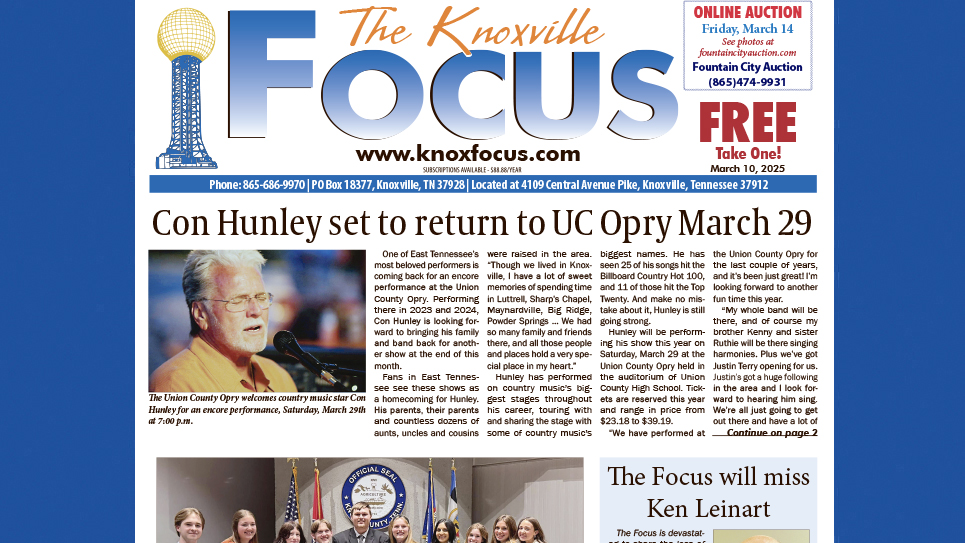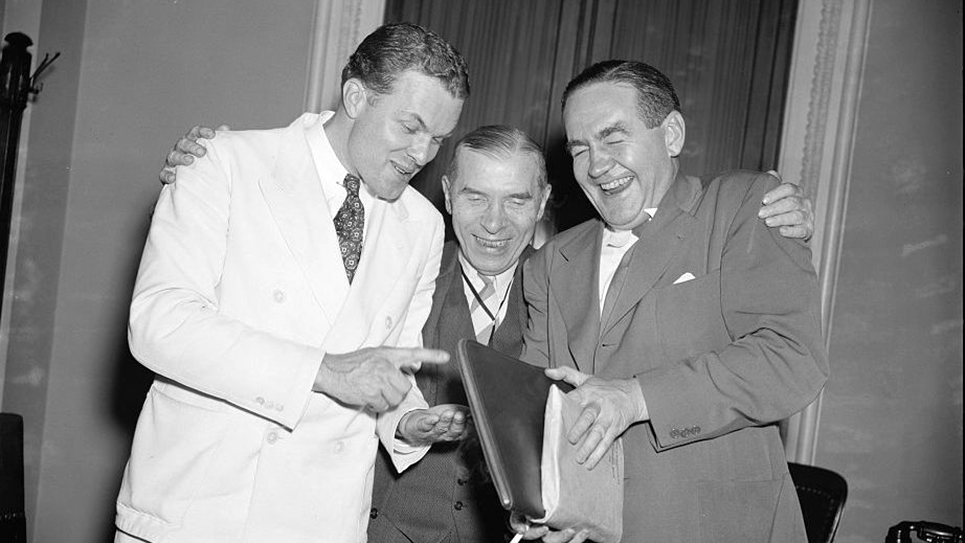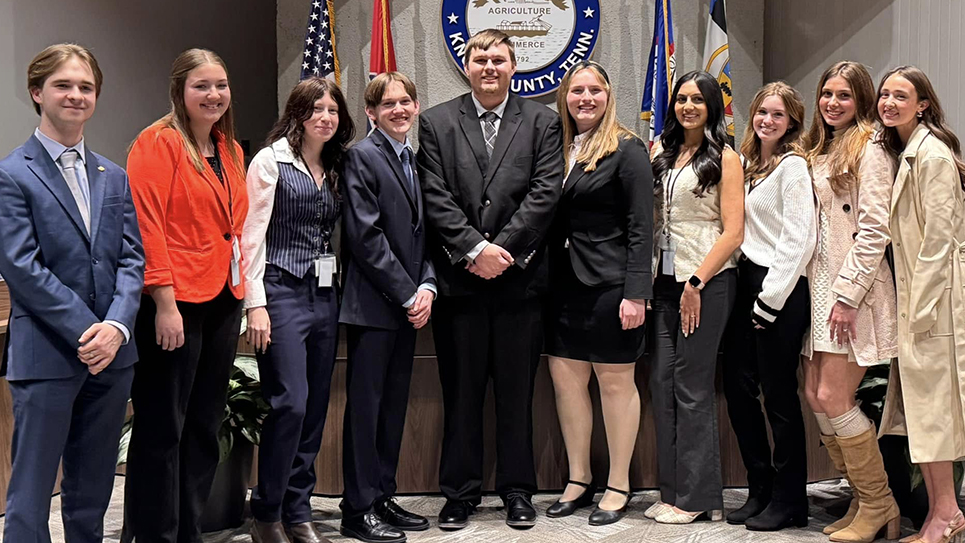Battle of The Titans: Carmack versus Taylor
By Ray Hill
Politically speaking, Tennessee has never lacked for talent or ability. To get to the United States Senate, Kenneth D. McKellar had to defeat two of Tennessee’s most recognizable Democrats, as well as the best vote-getter the Republicans had to offer. Over a period of time, McKellar had to dispatch the minority leader of the U.S. House of Representatives, the mayor of Knoxville, a future congressman, and a candidate who had quite nearly beaten his colleague. The 1906 campaign for the United States Senate truly was a contest between political titans. Edward Ward Carmack had defeated an incumbent congressman in 1896 and then had to convince a hostile Republican majority in Congress to seat him. With a head topped by a mop of curly red hair and a shaggy mustache, E. W. Carmack was a frequently fiery and able speaker, who possessed a magnetic and dynamic personality that made him many friends throughout the Volunteer State. Elected to the U.S. Senate in 1900, Carmack was seeking a second term and was challenged by one of the most formidable campaigners in Tennessee history: Robert Love Taylor.
Taylor, bald with a walrus mustache, was a legendary speaker at a time when forms of public entertainment were quite limited. There was no radio, no movies or television. Robert L. Taylor, being a gifted speaker, made considerable money through his public speaking throughout the country. “Lecturing” from the platform kept the wolf away from the door for many a former officeholder. There was no doubt of Taylor’s personal popularity as he had been elected as a Democrat to Congress from the highly GOP First District. Robert L. Taylor had also been elected governor of Tennessee three times. Delong Rice, who managed Taylor’s lecture tours, once speculated, “If all his audiences could be gathered they would make a multitude of millions of people.” Taylor was one of those who could make a flowery speech on any number of occasions, giving eulogies that made audiences both laugh and cry. Robert Love Taylor spoke at countless commencement ceremonies and addressed every kind of civic organization under the sun, and from the stages of theatres throughout the Southland. Like any gifted storyteller, Taylor was full of good humor and was especially popular in the South where he spoke to how the people of the South lived, worshipped and voted. Known in his native Tennessee as “Our Bob,” Taylor was serving as governor during the Volunteer State’s Centennial, which gave him numerous occasions to speak and celebrate his own state. Born into one of the most prominent political families of the time, Bob Taylor, along with his father Nathaniel and brother Alf, all served as congressmen from Tennessee’s First Congressional District. An uncle, Landon Carter Haynes, was a speaker of the Tennessee House of Representatives. Father Nathaniel lost a congressional race to Andrew Johnson, but he was later appointed commissioner of Indian Affairs when the latter became president. One of ten children, four daughters and six sons, Bob and Alf Taylor both ran for governor in 1886. Alf was the Republican nominee while brother Bob was the Democratic nominee; supporters wore a white rose for Bob and Alf’s wore a red rose.
One reason for Bob Taylor’s popularity was his ability to straddle issues and not offend others. A sensitive man, Robert Love Taylor suffered when opponents criticized him and his record as a public official, although he didn’t hesitate to jab his own opponents. Although he had served three terms as governor, Bob Taylor did not enjoy being the chief executive of Tennessee. Soft-hearted and always willing to hear a sob story, Governor Taylor was known for his many pardons. One young man convicted by an angry judge was represented by attorney Kenneth McKellar who promptly asked the governor for a pardon. Taylor obliged and the now furious judge promptly put the young man back in jail. McKellar sought yet another pardon, which was granted. The judge complained and was told Governor Taylor had said he could pardon the young fellow as often as the judge could put him in jail.
The office that “Our Bob” really yearned for was that of United States senator. Taylor had sought to defeat former Confederate General and Governor William B. Bate in 1893 before the legislature and lost. Taylor consented to run for governor again in 1896, probably because he believed the state legislature would reward him by electing him to the U. S. Senate. When Senator Isham G. Harris died in 1897, the legislature overlooked Governor Taylor to fill out the remainder of Harris’ term. Disillusioned and ill, Taylor did not seek reelection in 1898.
When 78-year-old William Bate died in 1905, just days into a new six-year term, Taylor sought to be elected to succeed the late senator; the legislature chose another aspirant instead. What helped Bob Taylor finally achieve his longstanding political ambition was holding a primary election. The legislature still elected United States senators and while the preferential primary was not legally binding, most candidates for the General Assembly campaigned as either partisans of Taylor or Carmack. Both Senator Carmack and former Governor Taylor hit the campaign trail.
Tennesseans were also deciding a hot contest to determine the winner of the gubernatorial primary. John Isaac Cox had succeeded to the governorship when incumbent James B. Frazier had been elected to the United States Senate. When Governor Frazier had resigned his office to go to Washington, D.C., Cox, speaker of the state Senate, ascended to the governor’s chair. Cox, from Bristol in East Tennessee, was being challenged inside the Democratic primary by Congressman Malcolm Rice Patterson of Memphis. Both the race for the U.S. Senate and the governorship became heated quickly.
It was the election of James B. Frazier to the U.S. Senate that was at the heart of the 1906 senatorial contest. Frazier had just been reelected to another two-year term as governor when he was elected to the United States Senate by the legislature in a stampede, crushing Bob Taylor’s hope of going to the Senate. Many Tennesseans objected to the rush to move Frazier out of the governor’s office, allowing John I. Cox to succeed to the governor’s chair and there was an outcry from many newspapers across Tennessee. Senator Carmack was thought to be behind the election of James B. Frazier to the U.S. Senate. Bob Taylor was out to right the wrong he felt had been done to him in 1905.
After arriving in Nashville from Washington, Senator Carmack spent a day consulting with his campaign chieftains before heading out to speak on the stump. Newspapers, both daily and weekly, aligned with one candidate or the other. The Nashville Tennessean favored Senator Carmack and followed his campaign closely. Speaking in Carthage in Smith County, the senator was greeted with cheers from the audience, estimated at 3,000 people, as he appeared on the platform. The crowd got what they came for as Senator Carmack spoke for two and a half hours. Carmack’s speech was a rousing defense of his six years in the United States Senate.
While Carmack was mesmerizing the crowd at Carthage, Bob Taylor was drawing what was thought to be one of the largest audiences ever gathered in Fayetteville. The former governor was greeted by a brass band when he disembarked from the train, accompanied by a float populated by twenty-five young ladies. Escorted to a local hotel, Taylor made an impromptu talk. Moving to the local courthouse, Taylor quickly concluded his audience was so large and the venue was too small. The noise generated by those who could not hear the former governor caused Taylor to decide to move his speech to the opera house. There were so many people populating the makeshift platform at the courthouse that it collapsed; fortunately, no one was hurt. The crowd waited in the street for almost an hour for the doors to the opera house to open before Taylor began speaking.
Well before good roads, Tennesseans did not travel as far or as frequently as they do now. Senator Carmack drew an audience of some 1,500 people in Gainesboro, but because of the “high water” locally, many who wished to attend could not get to the speaking. Those who did make it to the speech “jammed every bit of available space in the courthouse.” Carmack spoke for two hours, batting away and refuting charges that the senator claimed were being circulated by Bob Taylor and his campaign.
To give modern-day readers an idea, Senator Carmack’s appearance in Nashville was advertised as opening the doors at 5:30 p.m. when the speaking was to begin at 7:30 p.m. Former Governor Taylor spoke in Winchester in Franklin County where he received “one of the greatest ovations ever given a public speaker” by local Democrats. Taylor’s train was once again met by a band and people had gathered on horseback, riding in surreys and buggies before more than 2,000 people moved to the courthouse to hear the former governor speak. “Our Bob” held forth for quite nearly three hours. Taylor’s speech was typical for the former governor; he paid tribute to the Confederate soldiers while stressing all he had done for the people while serving as governor. Reminiscent of the earlier “War of the Roses,” Taylor supporters wore a white ribbon on their lapels while Carmack’s backers wore red ribbons. It was not enough to demonstrate one could speak well or memorize a lengthy address, the best speakers and candidates could think fast on their feet. A young boy waving a Carmack banner from a window of the courthouse caught Bob Taylor’s eye. “Young man, it’s a pity you didn’t do that for Carmack when he was here,” the former governor bawled, bringing cheers and laughter from the crowd. After Miss Clara Belle Williams gave Taylor a “beautiful wreath of flowers,” the former governor paid a glowing tribute to the women in the audience.
Robert Love Taylor journeyed to Cannon County to make a speech and was greeted outside of town by some two hundred people who accompanied the former governor into Woodbury. Taylor gave a verbal whipping to Carmack’s supporters and ridiculed the notion the senator had been called back to Washington on business.
As Senator Carmack arrived in Livingston, Tennessee, he was greeted by a group of young men and women, who accompanied the solon to his destination, the Commercial Hotel. There Senator Carmack greeted friends and callers until it was time for him to speak. The Columbia Herald published an editorial as the preferential primary election approached, stating when the campaign first began even Senator Carmack’s “best friends” thought he had virtually no hope of winning reelection. The Herald lamented Carmack had become associated in the mind of many Tennesseans with the “Frazier rape of the senatorship.” Acknowledging that to have been “an outrage,” the Herald editorial stated Tennesseans had become convinced Carmack was indeed innocent of having interfered in the selection of his senatorial colleague. The editorial also recognized Robert Love Taylor as the “best known man in the state” as well as his popularity with the people. The Columbia newspaper thought people were changing their minds after some reflection and Carmack was picking up steam.
The results of the primary were conclusive. The Columbia Herald was correct; if Bob Taylor was not the most popular man in the State of Tennessee, he was certainly the choice of a majority of Tennesseans to serve them in the United States Senate. It had been a hard-fought contest; Knox County had supported Bob Taylor, albeit by the tiniest of margins, a mere fifteen votes. Taylor carried Davidson by 750 votes and Hamilton County by 358 votes. Edward Ward Carmack had carried his home county of Shelby by 5,000 ballots.
Taylor would serve in the U.S. Senate until his death. E. W. Carmack would make a failed race for governor in 1908 that was the precursor to his assassination.
© 2024 Ray Hill







